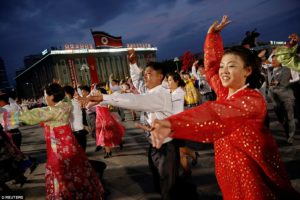Special to WorldTribune.com
 By Donald Kirk
By Donald Kirk
To the rest of the world North Korea is an enigma. No one knows what’s happening among the elite who govern the country.
There’s no telling what people are really thinking and saying on the streets of Pyongyang and other cities, much less in remote regions.

All we get as journalists writing about North Korea are clues. We see reports via Pyongyang’s Korea Central News Agency. We get snippets of cellphone conversations via two or three websites purporting to cover North Korea.
We hear accounts of harrowing experiences from defectors. We occasionally go to North Korea on carefully guided and monitored tours.
Writing about North Korea, no one can claim omniscience – or even expertise. Guides – they’re called “minders” – block visitors from talking to people privately.
You can’t call the foreign ministry. You can’t go anywhere except in a van with other visitors hitting the sights.
Outside Pyongyang, the van takes you to destinations deemed suitable for visitors. At the North Korean side of the truce village of Panmunjom, a mid-level Korean People’s Army officer offers a briefing and poses for pictures against the background of Freedom House across the way on the South Korean side beyond aluminum-walled hooches straddling the line.
You cannot seriously double-check anything. If South Korea’s National Intelligence Service says people in North Korea’s ministry of state security have been executed, there’s no way to verify that report. No doubt some reports of executions are true, but there’ve been cases where someone was said to have been eliminated, only to turn up later.
Someday the world may get a first-hand account of the human rights abuses about which much is written. No one, however, has gotten close to the infamous prisons where tens of thousands of North Koreans, according to accounts from defectors, are incarcerated, tortured and often executed. Defectors tell us about starvation, disease and executions, but we see none of that. Nor do we know about rivalries in Pyongyang other than whatever may be gleaned from statements and lists of members of leaders of the Supreme People’s Assembly or Workers’ Party Committee or armed forces.
Journalists in Pyongyang may go on more trips outside the capital and may get more briefings, but they get no closer than anyone else to these stories. The Associated Press maintains a bureau staffed by a local reporter and photographer from the Korean Central News Agency who don’t go beyond the official line. An AP correspondent visits from Tokyo, but he too goes nowhere without a minder.
Despite impediments, however, coverage of North Korea has gotten more extensive in recent years. One reason is that sources in the North get through to friends, relatives and media contacts in the South via cellphones mainly on Chinese networks. Some of these sources report fairly often. One or two news organizations say they’re in regular touch with people there. There’s no way of double-checking these reports, but they provide a glimmering, unsubstantiated view of what’s going on.
Trying to report on North Korea, the media pounce on announcements from South Korea’s defense ministry and from the foreign and unification ministries reacting to statements and reports from Pyongyang. Satellite imagery and seismic measurements bear out reports of missile and nuclear tests. Reporters get in touch with “experts” at think tanks and universities for analyses. Statements from Pyongyang are often quotable as propaganda reflecting the outlook of the regime.
Putting together all such material, correspondents find much to write about North Korea. The big story, though, will only be told when journalists come and go freely in and out of North Korea in an unforeseen era of peaceful reunification and opening or a time of upheaval, revolution and conflict. No one’s taking bets on when, how, or whether any of that is going to happen.
Donald Kirk has been covering war and peace in Asia for decades. He’s at [email protected].
